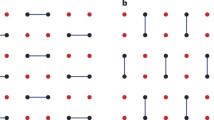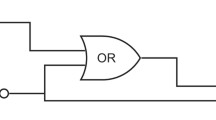Abstract
We explore in the framework of Quantum Computation the notion of Computability, which holds a central position in Mathematics and Theoretical Computer Science. A quantum algorithm for Hilbert's tenth problem, which is equivalent to the Turing halting problem and is known to be mathematically noncomputable, is proposed where quantum continuous variables and quantum adiabatic evolution are employed. If this algorithm could be physically implemented, as much as it is valid in principle—that is, if certain Hamiltonian and its ground state can be physically constructed according to the proposal—quantum computability would surpass classical computability as delimited by the Church—Turing thesis. It is thus argued that computability, and with it the limits of Mathematics, ought to be determined not solely by Mathematics itself but also by Physical Principles.
Similar content being viewed by others
REFERENCES
Benioff, P. (1980). The computer as a physical system. Journal of Statistical Physics 22, 563-591.
Bernstein, E. and Vazirani, U. (1997). Quantum complexity theory. SIAM Journal of Computing 26, 1411.
Braunstein, S. (1998). Error correction for continuous variables. Physical Review Letters 80, 4084.
Calude, C. S. and Pavlov, B. (2001). Coins, quantum measurements and Turing's barrier. Preprint quant-ph/0112087.
Childs, A. M., Farhi, E., and Preskill, J. (2001). Robusteness of adiabatic quantum computation. Preprint quant-ph/0108048.
Davis, M. (1982). Computability and Unsolvability, Dover, New York.
Etesi, G. and Németi, I. (2001). Non-Turing computations via Malament-Hogarth space-times, gr-qc/0104023.
Farhi, E., Goldstone, J., Gutmann, S., and Sipser, M. (2000). Quantum computation by adiabatic evolution. Preprint quant-ph/0001106.
Feynman, R. P. (1982). Simulating physics with computers. International Journal of Theoretical Physics 21, 467.
Grover, L. K. (1997). Quantum mechanics helps in searching for a needle in a haystack. Physical Review Letters 79, 325-328.
Itzykson, C. and Zuber, J.-B. (1985). Quantum Field Theory, McGraw-Hill, New York.
Kadowaki, T. and Nishimori, H. (1998). Quantum annealing in the transverse Ising model. Physical Review E 58, 5355.
Kieu, T. D. (2001a). A reformulation of the Hilbert's tenth problem through Quantum Mechanics. Preprint quant-ph/0111063.
Kieu, T. D. (2001b). Gödel's Indompleteness, Chaitin's ω and Quantum Physics, quant-ph/0111062.
Kieu, T. D. (2002). Computing the noncomputable. Contemporary Physics 44, 51-71.
Kieu, T. D. (2003). Numerical simulations of a quantum algorithm for Hilbert's tenth problem. Preprint quant-ph/0304114.
Lloyd, S. and Braunstein, S. L. (1999). Quantum computation over continuous variables. Physical Review Letters 82, 1784.
Matiyasevich, Y. V. (1993). Hilbert's Tenth Problem, MIT Press, Cambridge, MA.
Nielsen, M. A. (1997). Computable functions, quantum measurements, and quantum dynamics, Physical Review Letters 79, 2915-2918.
Nielsen, M. and Chuang, I. L. (2000). Quantum Computation and Quantum Information, Cambridge University Press, Cambridge, UK.
Ord, T. and Kieu, T. D. (2003). The diagonal method and hypercomputation. Preprint math-LO/0307020.
Ozawa, M. (1998). Measurability and computability. Preprint quant-ph/9809048.
Renyi, A. (1970). Probability Theory, North-Holland, New York.
Rogers, H., Jr. (1987). Theory of Recursive Functions and Effective Computability, MIT Press, Cambridge, MA.
Ruskai, M. B. (2002). Comments on adiabatic quantum algorithms. Preprint quant-ph/0203127.
Shor, P. W. (1997). Polynomial-time algorithms for prime factorization and discrete logarithms on a quantum computer. SIAM Journal of Computing 26, 1484-1509.
Wooters, W. K. and Zurek, W. H. (1982). A single quantum cannot be cloned. Nature 299, 802-803.
Author information
Authors and Affiliations
Rights and permissions
About this article
Cite this article
Kieu, T.D. Quantum Algorithm for Hilbert's Tenth Problem. International Journal of Theoretical Physics 42, 1461–1478 (2003). https://doi.org/10.1023/A:1025780028846
Issue Date:
DOI: https://doi.org/10.1023/A:1025780028846




